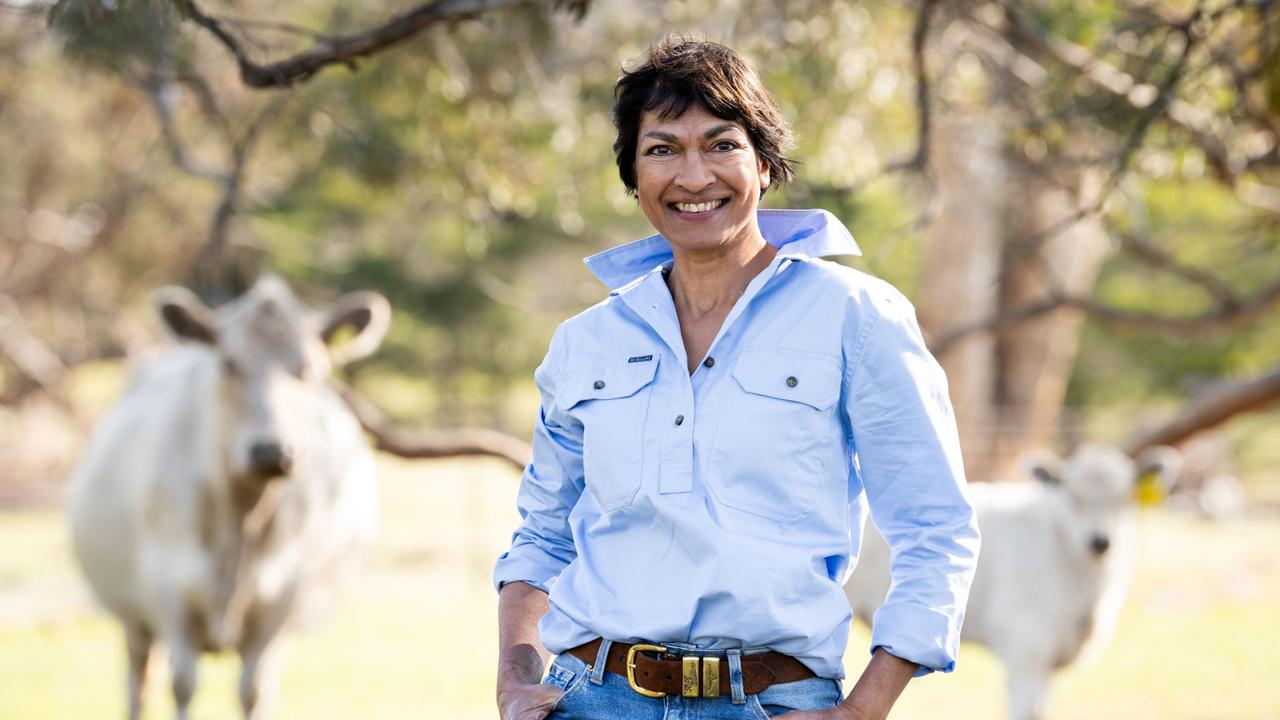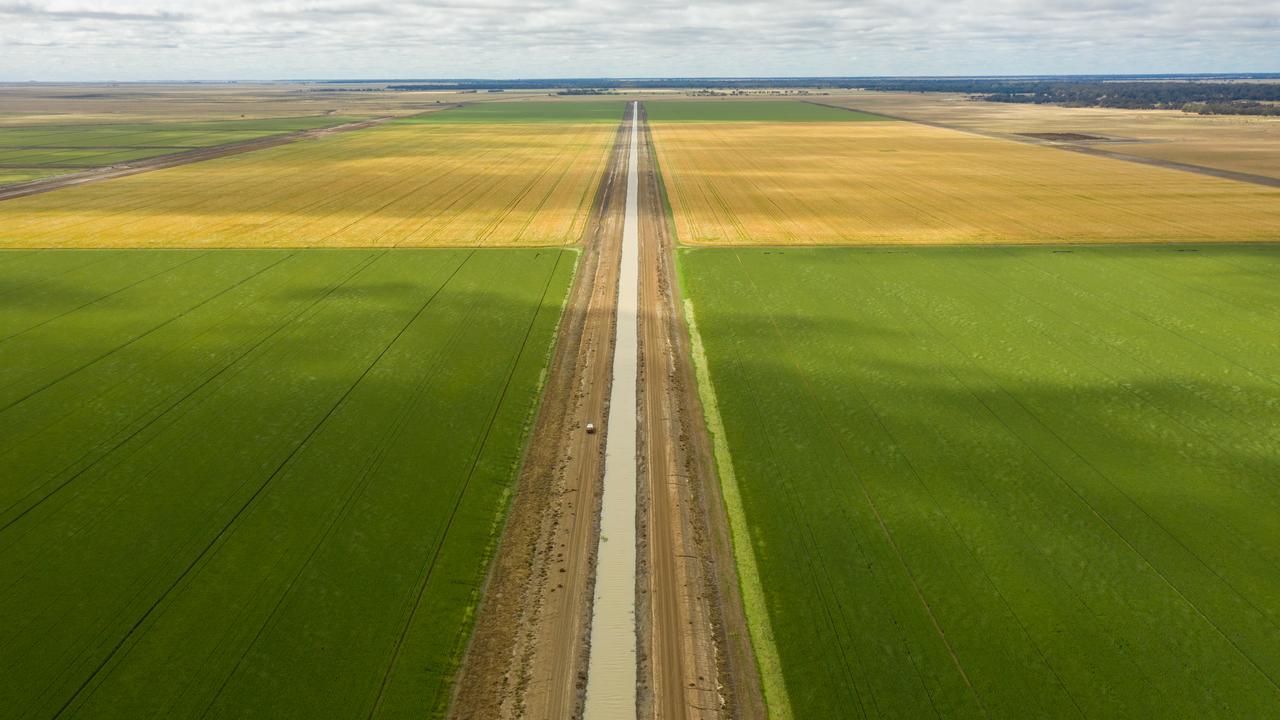Pure Grain Network: Stuart Tighe reinvents grain marketing
A former farmer is cutting out the marketing middlemen to give grain growers a better deal, and beer drinkers a better pint.
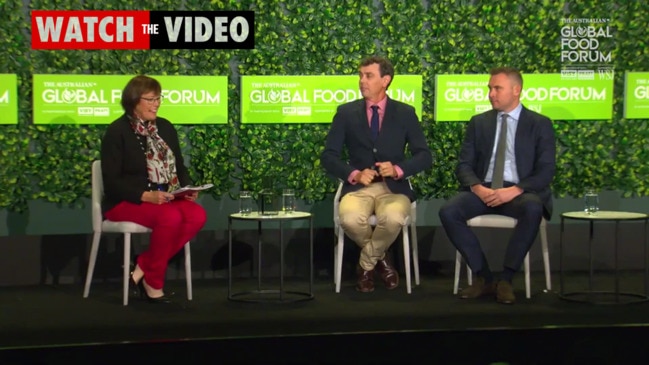
It was an image that captured the attention of Australia’s farming world.
A long red freight train, wending its way across the NSW countryside laden with 6000 tonnes of barley and chickpeas heading for Newcastle port, that had been directly leased by an upstart young grower from Moree tired of seeing his crop profits eroded by middlemen, excessive logistics and transport costs and inefficient grain handling corporations.
Simply Stuart Tighe, then 36, had had enough.
Instead he decided to rent a train from the state freight train company, fill it with his own just-harvested grain to sell at port direct to global traders and exporters, and encourage other disgruntled local producers to join in and share in the savings of at least 30 per cent of their farm-to-port transport and storage costs.
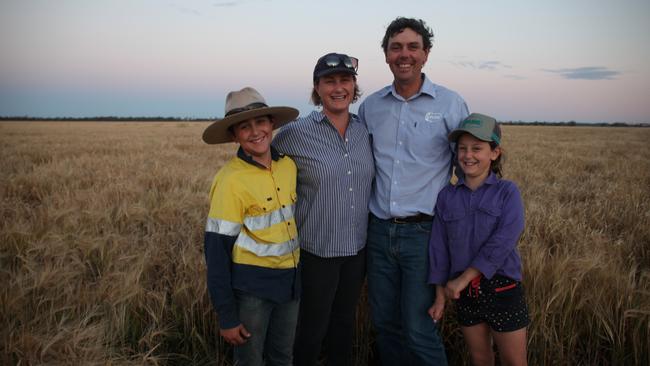
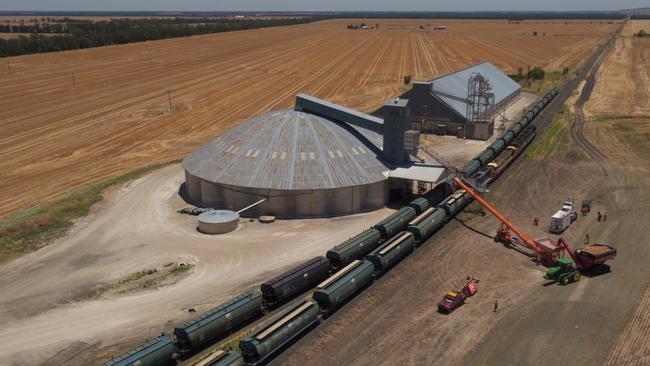
His innovative punt worked. The novel idea caught the imagination of other farmers cropping the fertile black soil plains around Moree, with 48 laden grain wagons and a rented freight train stretching 750m soon heading direct for Newcastle. It was also the first time the freight train company had leased a train directly to a farmer to load produce from his own farm trucks and silos.
The year was late 2016, and for many in Australia’s tight-knit but sprawling agricultural world, it was the first time they had heard of Stuart Tighe from Pallamallawa in NSW’s rich northern cropping belt.
“One of my obsessions has always been trying to find a market for all the different crops we grow outside normal (bulk) channels,” says Tighe, who left school, the family farm and his home town of Guyra when just 16 in 1994. He only lasted six months at agricultural college, before sweeping floors in a shearing shed in Queensland, and then heading to Moree to find work with large-scale cropping farmers.
“If you can cut out the middlemen and have farmers dealing directly with their customers that’s even better, because the grower can provide exactly what the customer wants and there is full traceability for the client about how the grain he buys was grown and exactly where it is sourced from.
“It also means farmers who grow better quality or niche barley varieties are rewarded for their extra effort, and not just by achieving better yields in the paddock (more tonnes per hectare).”
Three years later the enthusiastic, full-of ideas Tighe started sharefarming some of his employer’s land, swapping his labour and time in return for a share of final crop profits. The next year, 1999, he could afford to lease a tractor and started a contract sowing and spraying service for local cotton farmers.
By 2002 Tighe had bought his first small farm, Dimboola, married his wife, Lyndall, and started to manage and crop the neighbouring farm for its absentee landlord.
A couple years later, this young-man-in-a-hurry was contract farming and cropping six disparate land blocks totalling 5000 hectares for other growers as well as his own young family.
“Looking back, even then I had a system,” Tighe says. “I’d organise all the sourcing of our inputs and saw that with scale I had much greater bulk buying power. I found I could go to local suppliers and do a chemical or fertiliser deal at a much better price, which meant I could then afford to lease or buy another new machine or tractor.
“I guess you could say that was the start of everything.”
BUILDING BOOLAH FARMS
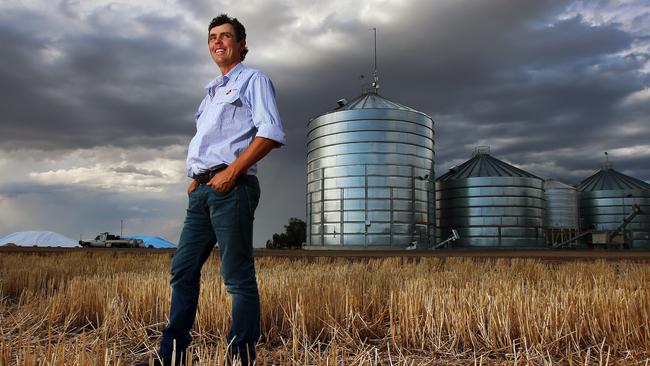
It was a modest beginning for Tighe who now, nearly 20 years later, is regarded as one of the most innovative leaders and progressive thinkers in Australia’s grain industry.
Still based in northern NSW, the lanky ex-farmer, now 44, assembled a like-minded team which has now built his own vertically integrated cropping business, with a core focus of connecting Australia’s specialised malting barley growers and the supply chain to better suit the needs of Australia’s major brewing companies and maltsters, and changing tastes of Australia’s beer drinkers.
Tighe calls it a “seed to sip” full traceability approach. It gives consumers much more knowledge and choice about the way their grain – or in the case of malting barley, their beer – was grown and produced, down to the farm it came from.
It’s a modern consumer development, hastened through the widespread use of QR codes.
While common in the branded and premium beef, lamb and wool farming worlds, it has largely been missing from Australia’s $12 billion grain industry where most produce is handled and treated as a bulk commodity.
Unusually, Tighe has not just built and introduced these innovations into his own family farming enterprise. Instead he has attracted a group of major investors – both private individuals and corporate agriculture – to back his broader endeavours and share the benefits with other growers.
In the process he has established a novel co-farming model for grain production in northern NSW, known as Combined Northern Ventures. It has at its heart a pooled, almost cooperative system of sharing costs and profits across numerous farms, owners and regions in the group to spread both geographical risk, boost production and logistics efficiencies, and ensure scale to meet the demands and needs of large scale grain customers.
Then there is Boolah Farms, the company Tighe originally founded and still owns a major stake in, which has morphed into a leading farm management, broadacre crop contracting and supply chain business. It runs all the farms pooled within CMV as one business, and makes all the decisions about crop varieties, rotations and production choices for the 25,000 hectares of farms spread from North Star to the Liverpool Plains that it cooperatively manages, down to the segregated grain types being stored after harvest in its own vast bunkers at Gunnedah, Milguy and Belahna.
And finally, Tighe has most recently established a much larger agricultural marketing company, Pure Grain Network, which has a high-powered executive team and board of directors, and is potentially aiming to become a global force.
It is a business which helps connect large growers anywhere in Australia directly with their customers, especially in the malting barley world which Tighe knows best, with the ability to help aggregate grain tonnages and provide full production data and logistics to the customer for each crop.
PURE GRAIN NETWORK

Tighe, who recently stepped away from Boolah Farms and is now chief executive of Pure Grain, says the network allows customers such as Japanese brewing giant Asahi, which owns Carlton and United Breweries, and consumers of popular beers to trace exactly where the barley in their beer, one of its main ingredients, comes from.
Pure Grain now represents more than 25 of the biggest barley growers across Australia, representing a fifth of the national malting barley crop. It recently brokered a deal to supply 40,000 tonnes of malting barley with full traceability direct from northern NSW farms to CUB’s biggest brewery at Yatala, near Beenleigh on Queensland’s Gold Coast.
Yatala brewing manager Garry Menz says that if the barley he buys can be traced back to specific farms, he can work more closely with its growers to monitor protein levels at barley harvesting. Menz is convinced better-grown barley means better beer. And with the advent of more niche and craft beers, as well as growing environmental consciousness, consumers are starting to care about its ingredients and how the barley crop is grown. “(Buying direct) gives us the ability to select different varieties (of barley) from different farmers for different beers; it lets us better understand barley quality on farm, which will lead to improvements in beer flavour and consistency,” Menz says.
Stuart Tighe says the new Pure Grain direct selling system is a win for growers, consumers and the big brewers. There are logistical, transport and storage efficiencies to be gained by aggregated direct selling between farms and the brewing giants, which means more of the grain’s inherent value stays within the supply chain.
The savings are split equally between growers in the form of higher prices, barley purchasers who have less costs and Pure Grain, the facilitator, data providers and logistics co-ordinator.
“And, as a farmer, any time you are growing a crop with a particular customer in mind – as happens if you have a long-term contract to supply malting barley to a brewer – I know from personal experience it makes you a lot more focused and particular,” Tighe says.
“Every time a rain event happens, or something affects your crop before harvest, or you are collecting data on your water and chemical use and carbon footprint, as a farmer it makes you much more focused on what you are doing, and how that might affect the way your grain is eventually used – in this case in the malting process.
“You can also see that there is a real value in all the data you are collecting for the buyer of your grain; you actually start thinking right through to the person who drinks the beer made from your barley.”
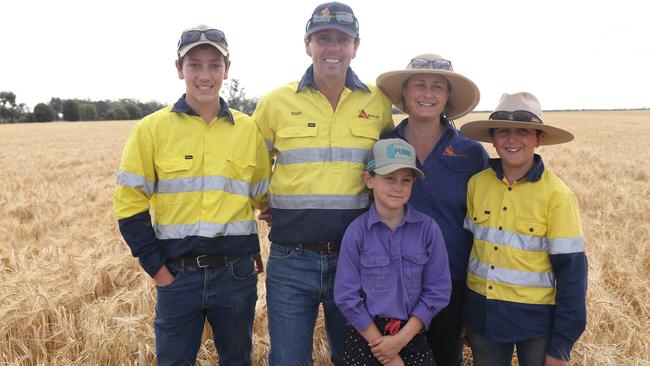
Local Moree farmer, investor and rural business owner Peter Birch – who has known Tighe since he first moved to the district – says at first he was regarded as just another keen bloke young trying to get a foothold in farming.
“He had some sheep and cattle of his own, he leased machinery and went contracting; you’d find him working at all hours and eating and sleeping in his tractor,” says Birch of those early days. Now a long term admirer of Tighe, Birch has placed some of his own farmland into the CNV pool, to be run and farmed by Boolah Farms, and with the harvested grain sold through Pure Grain channels.
“It was in logistics that he has always excelled. In those early days, he bought a couple of properties and put them together and kept on doing that; then the next thing you know he’s leased some disused silos on the train line near his farms, leasing his own trains, and putting time and effort into dealing with other farmers too,” Birch says.
“But it was in malt barley that he picked up on there being a real opportunity; he saw the malt houses were really frustrated in having to deal with the big companies like GrainCorp and never quite knowing what variety or quality of barley they were getting.
“Stuart realised the answer was for grain growers like himself to deal directly with the beer companies and maltsters and to supply exactly what they wanted. When he started to do that sort of innovative stuff – the train, the malting barley, the direct deals with big beer companies – and take control of his own marketing and partner with other growers, that was when everyone around here really started to sit up and take notice.”
Laconic Tighe admits he is personally not a great fan of universities and business schools, preferring to be out in the paddock “doing” and learning. But he acknowledges one of the most formative times in his business life was when he was chosen to attend a short executive development course for young agri-leaders run by Rabobank, in Sydney in 2009.
“I wanted to look at ways the Australian grower could retain more value in the supply chain and how to participate in the grain market after the deregulation of (monopoly exporter) the Australian Wheat Board (in 2005),” he says.
“But what the Rabobank course taught me was that the most important thing in business is to talk to your customers, your end-users, and know what they want.
“The sad thing was, I realised that like most grain growers I didn’t know who my customers really were, just as the end-users had also lost their connection with the farmers who are actually controlling what grain is produced in the field. And with that loss of connection, comes a loss of control of the supply chain for all parties.”
With his new knowledge Tighe set about determining who his real customers were and trying to meet with them. He ultimately settled on his most direct customers being the malt houses who bought his malting barley and then with their customers, the major brewing houses who used those special malts as the backbone of their beers.
“So I found three or four major beer companies and asked them what their brewers were looking for from their malt, and could I could help my customer, being the maltsters, be better able to supply what they wanted. And that’s where my understanding all really started.”
EXPANDING THE PLAN
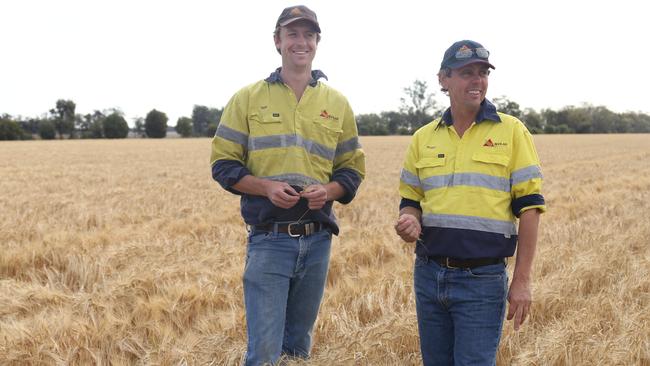
Curly-haired Stuart Tighe is standing with the new chief executive of Boolah Farms, Sam Conway, and glumly surveying the muddy, floodswept landscape around Bengalala Farm near Gunnedah, where his contract farming business is based.
Up near the big shed, a fleet of Boolah’s huge harvesters and tractors with caterpillar track treads sit idle, unable to harvest what is left of the ripe canola and barley crops lying in the surrounding paddocks that have been close-to-ruined by recent floodwaters. Across the farm, other early planted cotton and sorghum crops have been lost.
While the situation is enough to dim the enthusiasm of even Tighe, his lateral thinking, vision and optimism is already coming to the fore.
Tighe explains that last November’s floods are only helping prove the shared benefits of his co-farming model. Under the innovative Combined Northern Ventures model, more than 30 farms spread across northern NSW owned by seven major landholders including US-based Westchester, the Birch family and Tighe himself, are all valued based on their productive cropping land. The properties are then pooled into CNV, and each farm or landholder assigned a percentage share of the entire polled portfolio, which becomes the basis of both their cost contribution and profit share take.
All of the farmland within the CNV pool is contract farmed by operating entity Boolah Farms under Conway’s management, including which crops are grown where and when. Boolah Farms charges participating landholders a full commercial rate for all contracting operations, a per hectare management fee and participates in the final profit share.
The benefits for farmers are threefold. Firstly, they no longer have to personally run their own farms, but retain ownership of them.
Secondly, and most importantly, the risk of flood, hail, storm and even drought damage – and so financial disaster in any season – is mitigated by the combined farm portfolio being spread across more than 400km of northern NSW.
Finally, the grain produced on their farms is sold via the Pure Grain Network directly to end users, reaping cost efficiencies and supply chain value-creation bonuses.
One of Stuart Tighe’s agricultural business mentors and neighbours has long been Matthew Durack, a former part-owner of pecan and macadamia nut company Stahmann Farms – sold in 2017 to Canada’s PSP Investments.
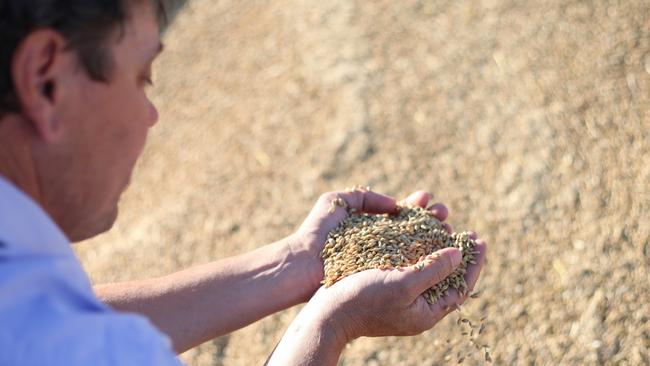
It was Durack who encouraged Tighe to put more structure into his hectic and complicated business operations.
“In terms of reducing risk, it’s the ultimate Kidman diversified property plan but for broadacre cropping instead of cattle,” says Durack, who sits on the board of Pure Grain as apart investor and also advises Boolah Farms.
“I also think it’s a good model for a better way of farming for young people entering the industry than expansion through leasing properties from retired farmers and sharefarming; they are not exciting models and usually end in tears.”
He says Tighe has “execution excellence” in spades, a strong streak of wanting to do things his own way, and an uncanny knack of identifying opportunities and new ways to add and create value.
“All of Stuart’s ventures are about sharing the benefits and (extra) value the parties together have created with each other, instead of about ego and greed.”
Tighe says his greatest challenge now – and one he thinks he is starting to achieve with both the early success of Pure Grain and his plans to take the NCV co-farming model pioneered in northern NSW to parts of Victoria, the Riverina and South Australia – is to develop a business that has enduring national and even international longevity and impact.
“I want to leave a lasting legacy, make real difference, in the grain world,” he says, “getting more value in the supply chain for farmers but also restoring that connection between farmers, their food and consumers, the grain-to-glass approach.
“If I have one regret – and I tell this to my kids and other young people – is that I spent too long in my 20s and 30s being busy on my farms, doing the doing, rather than working on the business and bigger ideas.
“You can’t just be busy and think that’s business; you have to have a plan.”



